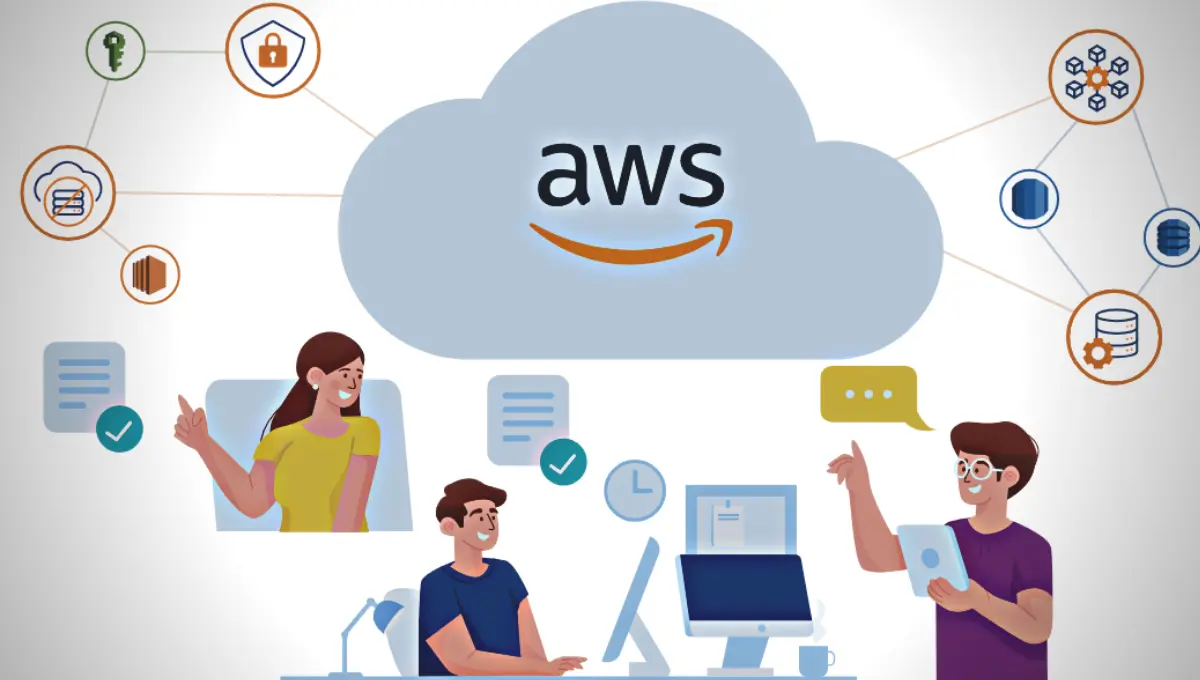
In today’s digital era, cloud computing has revolutionized the way businesses operate and individuals access services.
Amazon Web Services (AWS) stands at the forefront of this transformation, offering a comprehensive suite of cloud computing solutions. For beginners, navigating the world of AWS might seem daunting at first, but with the right understanding, the benefits are immense.
In this guide, we’ll delve into the fundamentals of cloud computing on AWS, exploring its key benefits, frequently asked questions, and how beginners can leverage this powerful platform.
What is Cloud Computing?
Table of Contents
Cloud computing refers to the delivery of computing services over the internet, providing access to resources such as storage, processing power, and software on demand. Unlike traditional on-premises infrastructure, cloud computing offers flexibility, scalability, and cost-efficiency, making it an attractive option for businesses worldwide.
Introduction to Amazon Web Services (AWS)
AWS is a comprehensive cloud computing platform offered by Amazon, encompassing a wide range of services to cater to diverse business needs.
From computing power with Amazon EC2 to storage solutions like Amazon S3, AWS provides a robust infrastructure for building, deploying, and managing applications in the cloud.
Unlocking the Power of Cloud Computing with AWS: Key Benefits for Beginners
In today’s digital age, the demand for scalable, flexible, and reliable cloud solutions is at an all-time high.
Amazon Web Services (AWS) stands as a pioneer in cloud computing, offering a comprehensive suite of services designed to empower businesses of all sizes.
For beginners venturing into the realm of cloud computing, AWS presents a wealth of benefits that can revolutionize the way they approach technology and business operations.

1. Cost-Effective Scalability:
One of the most compelling advantages of AWS is its pay-as-you-go pricing model. Beginners can leverage this model to access a wide range of services without the need for upfront investment in infrastructure.
AWS allows you to scale your resources up or down based on demand, ensuring that you only pay for what you use. This flexibility makes it ideal for startups and small businesses looking to minimize costs while maximizing efficiency.
2. Global Reach and Availability:
AWS boasts an extensive global infrastructure, with data centres strategically located in regions around the world.
This global reach ensures low-latency access to services for users regardless of their geographical location.
Beginners can take advantage of AWS’s high availability and redundancy features to deliver seamless experiences to their customers, no matter where they are located.
3. Robust Security and Compliance:
Security is paramount in the world of cloud computing, and AWS prioritizes it with a comprehensive set of security features and compliance certifications.
From data encryption and identity access management to network firewalls and threat detection, AWS equips beginners with the tools they need to protect their assets and comply with industry regulations.
This level of security and compliance instils confidence in customers and stakeholders, fostering trust and credibility.
4. Extensive Service Portfolio:
AWS offers a vast array of services spanning computing, storage, networking, databases, analytics, machine learning, and more.
Beginners can experiment with these services to build, deploy, and manage applications tailored to their specific needs.
Whether it’s running virtual servers with Amazon EC2, storing data with Amazon S3, or analyzing data with Amazon Redshift, AWS provides the building blocks for innovation and growth.
5. Seamless Integration and Innovation:
AWS is designed to integrate seamlessly with existing IT infrastructure and third-party applications, allowing beginners to leverage their current investments while embracing the cloud.
Additionally, AWS continually innovates and introduces new services and features to stay ahead of evolving technology trends.
Beginners can stay at the forefront of innovation by tapping into AWS’s ecosystem of tools, resources, and community support.
In conclusion, Amazon Web Services (AWS) offers a wealth of benefits for beginners embarking on their cloud computing journey.
From cost-effective scalability and global availability to robust security and extensive service offerings, AWS empowers beginners to unleash the full potential of cloud technology.
By harnessing the power of AWS, beginners can accelerate innovation, drive business growth, and stay ahead of the competition in today’s dynamic digital landscape.
Getting Started with AWS
- Create an AWS Account: Visit the AWS website and sign up for an account to get started. You’ll need to provide basic information and payment details, but AWS offers a free tier with limited usage to help you explore its services without incurring costs.
- Navigate the AWS Management Console: Once logged in, you’ll access the AWS Management Console, your central hub for managing AWS services. Familiarize yourself with the console’s layout and navigation to navigate seamlessly.
- Explore AWS Services: Take advantage of the vast array of AWS services, including computing, storage, networking, databases, and more. Start with simple services like Amazon S3 for storage or Amazon EC2 for virtual servers, and gradually explore advanced offerings as you gain expertise.
- Learn from AWS Documentation and Tutorials: AWS provides extensive documentation, tutorials, and training resources to help beginners get started. Take advantage of these resources to deepen your understanding of AWS services and best practices.
FAQ’S
Great! Let’s start by outlining the key benefits of AWS for beginners. Then we can address some frequently asked questions (FAQs) related to cloud computing on AWS. Here’s the content:
Q. What is AWS?
AWS, or Amazon Web Services, is a cloud computing platform offered by Amazon that provides a wide range of cloud services, including computing power, storage, databases, machine learning, and more.
Q. How does AWS differ from traditional hosting?
Unlike traditional hosting, which requires you to manage physical hardware, AWS offers a scalable and flexible cloud infrastructure that allows you to provision resources on-demand and pay only for what you use.
Q. Is AWS suitable for beginners?
Yes, AWS is suitable for beginners as it provides easy-to-use services, extensive documentation, and a free tier with limited usage to help newcomers get started with cloud computing at no cost.
Q. What are some common AWS services for beginners?
Some common AWS services for beginners include Amazon EC2 (Elastic Compute Cloud) for virtual servers, Amazon S3 (Simple Storage Service) for scalable object storage, and Amazon RDS (Relational Database Service) for managed databases.
Q. How can I learn more about AWS?
AWS offers a wealth of resources for learning, including documentation, tutorials, online courses, and certifications. Additionally, there are numerous community forums and user groups where you can connect with other AWS users and experts.
Conclusion:
Cloud computing on AWS opens up a world of possibilities for beginners, empowering them to build, deploy, and scale applications with ease.
By understanding the key benefits of AWS and addressing common questions, beginners can embark on their cloud journey with confidence, leveraging the power of AWS to drive innovation and growth.
If you like our post then you share it with your friends and family, to get informative content every day follow our site .